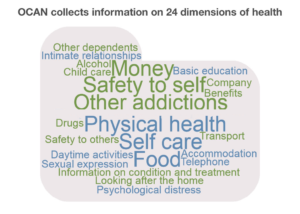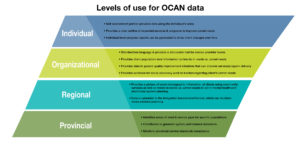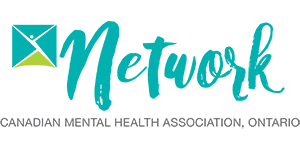The Ontario Common Assessment of Need (OCAN) is important tool used to identify the needs of clients receiving mental health and addictions services in Ontario. More importantly, perhaps, OCAN gives clients and the mental health professionals supporting them, a tool to appropriately track and monitor an individual’s recovery journey.
An evidence-based tool implemented in over 200 agencies across the province, OCAN was formed collaboratively by community service providers and clients. The tool has two components: a consumer-self assessment section and a staff assessment portion.
The self-assessment asks clients to identify various needs in areas of their life including accommodation, childcare, transportation, physical health, culture, spirituality, food security, and hopes for the future. The staff-assessment is completed with the client and includes a summary of actions and referrals to address unmet needs that the client chooses to focus on during their recovery planning. Re-assessments are then completed every six months to determine if there has been a change or positive progress in the client’s unmet needs.
OCAN captures the client voice
“The OCAN provides an opportunity for clients and service providers to record conversations that have traditionally occurred in community-based programs and record the information in a standardized and evidence-based way that drives service improvements for the individual, organization and system as a whole.” – Jennifer Zosky, OCAN Assessment Specialist, Community Care Information Management
 For clients, completing an OCAN means that decisions about their care will be based on the voice of the individual captured through the self-assessment and amplified by a conversation with a mental health and addictions service provider.
For clients, completing an OCAN means that decisions about their care will be based on the voice of the individual captured through the self-assessment and amplified by a conversation with a mental health and addictions service provider.
Staff are trained to use the OCAN as a means to guide conversation with the client rather than simply working through a paper-based assessment tool. The OCAN allows staff to prompt discussions with clients on 24 domains of health and social determinants, which provides comprehensive information used to discuss all aspects of an individual’s life.
The importance of a review with clients and staff every six months should not be overlooked. These reports visually demonstrate progress to clients and have been reported as being beneficial to service users because they can see their own progress through their recovery journey.
OCAN a service provider tool, too
Organizations also receive significant benefit from OCAN. Service provides can research collated OCAN data reports about their programs and services to help inform quality-improvement work. Reports can be generated at an organizational level that show service providers general trends in met versus unmet needs.

For example, one organization noted they didn’t collect adequate information on the domains of “sexual expression” and “intimate relationships.” To address this, the agency developed a training program to improve staff confidence and comfort when asking questions related to these areas of the OCAN.
For another organization, the OCAN data demonstrated that the “company” and “intimate relationships” domains were a significant unmet need for their population. The result: the creation of a program component where staff helped clients reunite with family and friends over Facebook.
Beyond the service provider, OCAN plays a valuable role in regional and provincial system planning and performance measurement. With client consent, the data from OCANs can be uploaded to a centralized database available to Ontario’s regional funding bodies, Local Health Integration Networks (LHINs).
LHINs use aggregated and de-identified OCAN data to understand client populations and needs of mental health and addictions clients, using the data to help enhance service delivery.
OCAN data can also help support advocacy at a regional or provincial level since the aggregate information can provide evidence of unmet needs of Ontario communities in domains such as money, food and accommodation.
The OCAN is playing a role in developing and generating system performance indicators for mental health and addictions in Ontario, as well as monitoring provincial service standards and understanding the needs and sociodemographic information of complex clients using community services.
The ongoing use and importance of OCAN is proof that this tool, created by clients and service providers, offers a multitude of benefits that should continue to be leveraged to enhance all aspects of the mental health and addictions sector.
Jenna Hitchcox is a Policy Analyst at Canadian Mental Health Association, Ontario.
